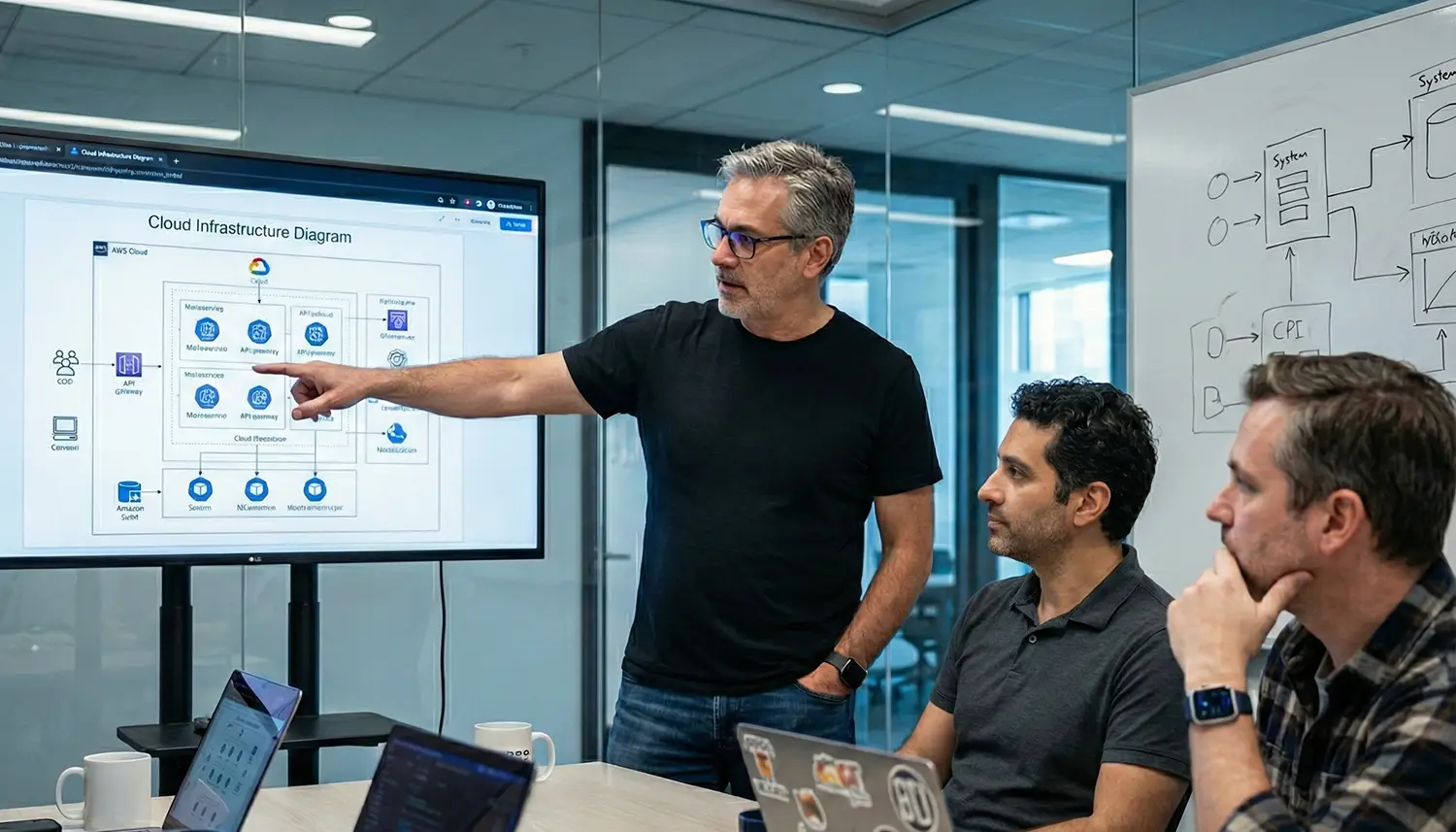As companies grow, IT infrastructures become more complex, demanding additional resources, expertise and proactive management. End-to-end managed IT services play a key role in streamlining operations and boosting business performance. By maintaining, troubleshooting and proactively improving business IT systems, these services enhance security, prevent problems and increase productivity.
Here, we’ll explore how using end-to-end managed IT services as a strategic tool can strengthen your business’s ability to succeed in a digital world by securing long-term viability and flexibility.

Embracing Technological Advancements
Managed service providers (MSPs) provide access to cutting-edge tools and the expertise of IT specialists. They will also implement, manage and upgrade these technologies for you; this ensures businesses have the latest enhancements without the need to deeply understand or invest heavily in them.
Managed IT service providers offer an advantage since they:
- Keep abreast of the latest technological trends and advancements in the IT industry
- Partner with leading technology vendors to gain early access to new tools and resources
- Invest in ongoing training and certification for their staff to obtain proficiency in the latest technologies
- Allocate resources to research and development to stay ahead of the curve
- Develop tailored solutions that incorporate new technologies in a way that aligns with the unique needs and goals of each business
Offering this level of expertise enables companies to leverage new software, platforms and systems to drive efficiency and innovation. By outsourcing this aspect of operations, businesses can focus on growth — while staying at the forefront of technological trends and maintaining a competitive advantage.
Scalability for Growth
As a business expands, managed services simplify the process of scaling the IT infrastructure to accommodate additional users, increased workloads and emerging technologies. With the necessary skills, expertise and resources, a service dedicated solely and fully to IT can seamlessly add and upgrade hardware, software and network capabilities. This helps guarantee the IT infrastructure evolves in tandem with business needs.
By tailoring technology to the size and needs of a business, these services allow for flexibility in resource allocation and cost efficiency. Businesses can easily scale IT capabilities up or down, responding quickly to market changes, customer demands or unexpected growth.
Furthermore, this approach minimizes downtime during scaling-up processes, ensuring businesses can evolve with the technology landscape without losing momentum.
Proactive Security Measures
Managed IT Services enhance proactive security measures, providing businesses with robust protection against cyber threats. These services offer a multi-layered strategy, including regular system monitoring, the application of patches and updates and the early detection of vulnerabilities. IT professionals employ the latest tools and best practices to guard against evolving threats and make sure defenses are always current.
Preventive maintenance is a core aspect of managed IT, with routine checks designed to identify and rectify potential security breaches before they can be exploited. Through continuous oversight, businesses benefit from immediate incident response, reducing the impact of any security event. Managed IT also delivers critical education and training for employees, heightening awareness of phishing and other social engineering tactics.
Disaster Recovery and Business Continuity
Financial service companies such as banking and medical institutions handle sensitive customer data routinely. Data breaches can compromise this information and jeopardize customers’ finances. Such breaches not only disrupt access to services, but also damage the institution’s reputation. Restoring lost trust is both expensive and time-consuming; managed IT services don’t only bolster cybersecurity, but ensure proactive disaster recovery if an incident should occur.
End-to-end managed IT services provide regular backup and disaster recovery plans, crucial for maintaining data integrity and minimizing disruption in the face of attacks. By proactively managing and updating cybersecurity measures, businesses can maintain customer trust and compliance with data protection regulations, shielding their operations from the consequences of cyber incidents.

Cloud Integration and Mobility
Cloud integration and mobility solutions offer a range of benefits that enhance business flexibility and efficiency. With cloud services, businesses reduce expenses related to on-premises infrastructure, as there is less need for hardware investments and maintenance. Employees can access data and applications from anywhere, at any time, on any device. This is increasingly crucial for remote work scenarios and a mobile workforce.
In addition, enhanced accessibility fosters a more responsive business environment. Cloud services facilitate seamless collaboration among team members, allowing for real-time updates, document sharing and communication, all of which improves project coordination and productivity. With tools for instant messaging, video conferencing and shared workspaces, team members can communicate and contribute to projects as if they were in the same office.
Furthermore, cloud-based disaster recovery and backup solutions safeguard organizational data during emergencies. Managed IT confirms robust security protocols are in place to protect data transmitted across networks. Not only does this offer peace of mind, but it’s key for compliance with modern data protection standards.
Data Management and Analytics
A key role of managed IT services is offering comprehensive data management and business intelligence solutions. This plays a crucial role in helping businesses effectively manage and interpret their data for informed decision making.
With capabilities like cloud computing and IoT integration, businesses can analyze data in real-time, allowing for immediate insights and responses to market conditions or internal business events. MSPs have specialized expertise in data management best practices, ensuring a business’s data infrastructure is optimized for efficient information collection, processing and analysis.
Utilizing machine learning and AI, service providers can interpret complex data sets and offer predictive analytics. These insights enable businesses to forecast future trends, customer behaviors and market opportunities. MSPs also certify data across various business functions is centralized. This makes it more accessible for analysis and eliminates data silos that can hinder comprehensive insights.
MSPs also certify data across various business functions is centralized. This makes it more accessible for analysis and eliminates data silos that can hinder comprehensive insights.
Adaptable IT Infrastructure
Managed IT services proactively oversee devices and networks in an agile and adaptable way. They monitor service performance, detecting when it dips below the required standard. Additionally, they deliver IT services in a modular fashion, allowing organizations to select and combine services that fit their specific requirements.
As needs evolve, services can be added or removed with minimal disruption. This also means businesses can expand or reduce their IT capacity as required without major capital investments or long lead times.
By leveraging these aspects of service delivery, MSPs enable businesses to have a resilient, modern and flexible IT infrastructure. Businesses can more readily adapt to market shifts, organizational changes and the inevitable evolution of their operational needs. This helps maintain continual alignment with the broader strategic vision of the company.
Industry-Specific Solutions
The best MSPs also work closely with clients to understand their business goals and develop customized IT strategies that support these objectives. They prioritize an infrastructure and best practices that align with every business’s unique long-term plans. This expertise allows businesses to swiftly implement new technologies and methodologies, keeping IT infrastructure modern and effective.
Take, for instance, the healthcare industry. MSPs play a vital role by guaranteeing the IT infrastructure adheres to strict industry regulations and standards, such as HIPAA for patient data privacy. They provide comprehensive support that includes:
- Managing electronic health records (EHR) systems to provide security, efficiency and compliance with regulations
- Implementing robust cybersecurity measures tailored to protect sensitive patient data
- Managing risk assessments and audits for compliance with healthcare laws and regulations
- Around-the-clock monitoring and support to maintain the high availability of critical healthcare systems, quickly addressing issues that could impact patient care or data accessibility
- Facilitating the set-up and maintenance of telemedicine platforms
- IT consulting for healthcare technology advancements such as AI diagnostics tools, IoT devices for patient monitoring and blockchain for secure data sharing
By handling these critical functions, managed IT Services enable healthcare providers to focus on patient care — secure in the knowledge that IT infrastructure remains reliable, secure and at the forefront of technological innovation.

Securing Success With Strategic IT Management
In leveraging managed IT services, you benefit from flexible and scalable technology solutions, cost optimization, proactive support and monitoring, enhanced security and compliance and strategic IT planning. Partnering with Growth Acceleration Partners (GAP) allows you to focus on your core competencies, confident in the knowledge that your IT infrastructure is in capable hands. We’re here to support your growth objectives every step of the way.
GAP’s experts consider your organization’s requirements, prioritizing manageability, performance, security and cost-efficiency. Moreover, we consider your corporate culture and the skill set of your existing team when matching services to business needs. Chat with an expert today and boost business efficiency with the best technology for your unique needs.
Chat with an expert today and boost business efficiency with the best technology for your unique needs



